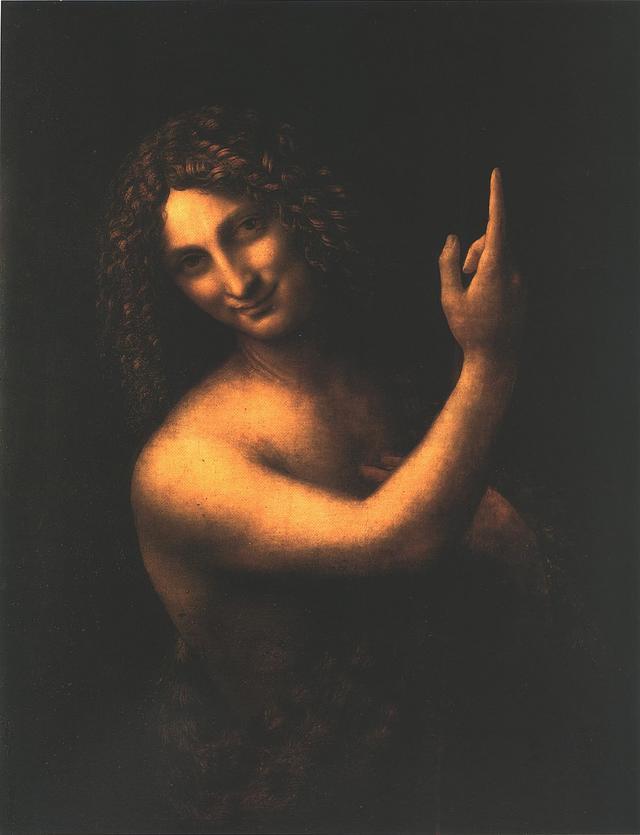Introduction
The work of art chosen for this paper is the well-known and one of the most beautiful paintings by Leonardo da Vinci, namely St. John the Baptist. This painting is performed in terms of portrayal characteristics that were favorite for da Vinci in his many-faceted nature. In this respect, the work represents a scope of vision that was mysterious in the artist. It is implemented, as a description of the curly long-haired man that shows a gesture by his hand wropt by the darkness. The whole construct of this painting is maintained in the nature of Renaissance and glory of antique art. Leonardo brilliantly describes the biblical motives but in a new shape that was particular for the epoch on the whole.
The painting St. John the Baptist is a manifestation of a widened vision on sacred themes that makes art more versatile and all-pervading. The reason is that such a pivotal idea is about to be proved on a deeper analysis of the painting’s details. That is why such features as lines, forms and relative scale are at a focus of the analysis. The response provided in the paper can serve as another viable argument for discovering da Vinci’s works of art and his artistic talent.
Main body
Produced in 1514, this masterpiece of visual arts represents a biblical scene corresponding to another perspective on viewing the follower of Christ with respect to the innovative understanding of scholastic treatments. The medium of the painting is implied in its mysterious and hardly recognized character. The question is that da Vinci adored antique culture in its significant features That is why the artist makes more emphasis on the figure of a man realized as St. John the Baptist. The art is aimed at reaching new frontiers of the understanding world and people. The stereotypes and bigotries are trite in it. That is why one should make out the picture by da Vinci, as an impressive implementation of a holy man under new “projection of artistic thought”. The painting runs the gamut of the Renaissance’s main prospects of describing people. In this respect, da Vinci lays more emphasis on the aspects of man’s beauty. St. John the Baptist is depicted in a rather beautiful perspective. It is an impressive and rather live characterization of a significant person in the Holy Bible.
The lines in the painting are merely plain. They are graciously leaning across the shapes of St. John’s upper part of the body. The frontal element of the whole performance is concentrated on the hand of the man. It is patterned with a particular gesture symbolizing the artistic idea of the Highest Power lingering all around. Light and color are combined to make more emphasis on some distinct parts of the body than on the whole illustration of it. It is a manner particular to Leonardo. His talent is in the mastership of using shade and color in their counterbalance. The relative scale of the painting is produced in terms of close frontal outlook. The picture is done similarly to drawing a portrait. However, the details of St. John the Baptists are concentrated more on the trait of shade implementation.
The magnificence of the whole construct of Leonardo’s painting is in its symbolic meaning. A curly, dark and long-haired half-naked man in the spring of life is a concept for the longevity of beauty in a man despite his/her destination in life. That is why a viewer should not judge the picture categorically by virtue of religion or some other motives. His little smile on his face is proving an idea of his satisfaction. There is no mask of dissimulation has no relation The unity of all characteristic features that are discovered out of the picture highlight the balance of means used by da Vinci. The palette of colors is not wide for one reason. The figure of St. John the Baptist is significant in the Christian world. Thus, notwithstanding peculiar touches characterizing Renaissance, the focal point is still in the gesture. Hence, the overall effect that is coming from the painting is considered with the aesthetic as well as religious motives.
Conclusion
Balanced features of body and shades in the concept of the picture are supposed to outline that the art is everlasting in its shape. It is a representation of how a man should value the heritage of the most fabulous and attractive works. The painting St. John the Baptist is a manifestation of a widened vision on sacred themes that makes art more versatile and all-pervading. It feels like being so in the life of human beings on different stages of historical cut. Owing to Leonardo da Vinci, Renaissance moved art forward omitting the biases and stereotypes dictated by the official church. In the example of da Vinci’s St. John the Baptist, the art of Renaissance flourished and made significant influences on the further development of aesthetical thought. This is why it is vital to be accurate while analyzing works of art in order to leave out the pit of fallacies.
